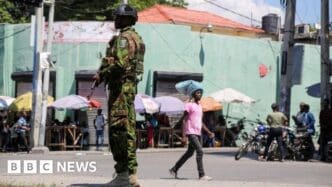In a chilling incident of violence in Port-au-Prince, Haiti, at least 110 elderly individuals have been killed by gang members linked to a voodoo-related accusation. According to the National Human Rights Defence Network (RNDDH), a gang leader blamed local elderly residents for his son’s mysterious illness, which allegedly led to the brutal attacks.
The gruesome events unfolded in the Cité Soleil area, where residents aged over 60 were targeted by gang members after being accused of practicing witchcraft. The RNDDH reported that the violence intensified following the death of the gang leader’s son. The leader, identified as Monel Felix, also known as Mikano, reportedly consulted a voodoo priest who suggested that witchcraft was behind the boy’s illness, leading to the horrifying retaliatory attacks.
Reports from the United Nations highlighted the escalating gang violence in Haiti, with the number of fatalities reaching approximately 5,000 this year alone. The recent killings, which left mutilated bodies in the streets, occurred primarily over two days. On Friday, about 60 individuals were killed, and another 50 were slain on Saturday. Eyewitnesses described scenes of brutality, with gang members employing weapons such as knives and machetes to execute their attacks.
The situation in Haiti has deteriorated following the assassination of President Jovenel Moïse in 2021, with gangs gaining control of significant portions of the capital. The Viv Ansanm gang alliance, of which Mikano’s group is a part, is known for its dominance over Wharf Jérémie, a crucial area for transport and trade in Port-au-Prince. Residents have faced severe restrictions, including being barred from leaving the area, causing delays in the dissemination of news about the violence.
Efforts to curb gang activity have seen little success. The Kenyan-led Multinational Security Support Mission, which arrived in June to back the Haitian National Police, has struggled due to inadequate funding and resources. Consequently, the gangs continue to exert immense control, utilizing tactics such as sexual violence to instill fear in the population.
Further complicating the security situation, the Transitional Presidential Council (TPC), tasked with restoring democratic governance, remains ineffective. Recent changes in leadership, marked by the replacement of the interim prime minister, have not led to significant advancements toward organizing elections or restoring order.
This recent spate of violence echoes a larger pattern of gang activity across the country, where ordinary citizens, more than rival factions, are increasingly the targets. This rise in violence has resulted in a staggering number of internally displaced persons, with reports indicating over 700,000 Haitians, including children, have been forced from their homes. The humanitarian situation remains dire, exacerbated by continued gang clashes and the lack of effective state intervention.
The violence in Haiti underscores the severe challenges faced by its citizens amidst unchecked gang influence. Despite international efforts to support local law enforcement, the country’s security apparatus remains overwhelmed. With gangs controlling a significant portion of Port-au-Prince, the path toward peace and stability in Haiti appears uncertain, leaving many residents in a state of fear and displacement.
Source: Bbc








